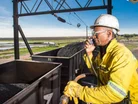South Africa Mining Sector Holds Breath on Nationalisation

South Africa’s mining industry is facing a period of uncertainty following the results of the country’s general election, which saw the ruling African National Congress (ANC) party lose its majority for the first time in 30 years of democracy.
This leaves the country facing the prospect of being governed by a coalition between the ANC, ruling alongside either the far-left Economic Freedom Fighters (EEF), MK – run by former president Jacob Zuma - or the liberal-minded Democratic Alliance (DA).
South Africa watchers say the prospect of left-wing influence would be a concern to mining companies, because of the fear mines will be nationalised, prompting investor exodus. Conversely, the presence of the DA in a coalition government would be welcomed by the mining sector, because the DA has pledged to encourage investment, and is opposed to state-owned mining companies.
South Africa is the African continent's top investment destination, with gas, renewables and mining all buoyant. A period of post-election uncertainty is likely to affect commodity markets, and with South Africa a major metals and mineral exporter this would be hugely damaging.
According to mining industry employer organisation Minerals Council South Africa, the country’s mining sector contributed US$23bn to GDP in 2023, representing 55% of total exports in the first 11 months of 2023. Around 80% of South Africa's commodity export revenue for 2023 came from platinum, coal, gold and iron ore exports.
In its manifesto, the ANC said it would aim to increase mineral exports to global and continental markets, leveraging the African Continental Free Trade Area. It also said it plans to impose export taxes on essential raw materials such as cobalt, lithium, graphite, chromite, manganese and platinum to encourage the country to build a metals and minerals refining capacity, adding value to its economy by moving it further up the supply chain.
This is a copy of the strategy that has worked so well for Indonesia, which is now the world's top refined-nickel producer, having spent a decade banning raw nickel exports in a bid to make itself a major producer of processed nickel. This saw it move up the supply chain and vastly increased the value of its nickel exports.
- COAL: Ranks sixth globally, producing 212 million tonnes – approximately 4% of world output. (Note: All figures in this list are for 2022.)
- CHROME: First globally (167,000 tonnes, 44% of world total).
- IRON ORE: Seventh worldwide; annual production of 170mn tonnes – 6% of global output.
- MANGANESE: World's 3rd largest producer (2.2mn tonnes – 18% of global production).
- DIAMONDS: Sixth globally (7.5mn carats).
- GOLD: Eighth overall (220,000kg – 3% of global output).
- COBALT: Tenth globally (2,300 tonnes – 2% of world production).
Anglo American, BHP key South Africa players
At present, Anglo American is a major player in the South Africa mining industry, operating Kumba Iron Ore – which produces 37mn tonnes annually – and also Anglo American Platinum, yielding 40,000kg yearly.
BHP, another giant, runs South32, which extracted 5.3mn tonnes of coal in 2022. Sibanye-Stillwater, meanwhile, dominates gold mining, producing 30,000kg per year from its Driefontein and Kloof mines.
Glencore's presence is also substantial, with its Tweefontein and iMpunzi collieries producing 28mn tonnes of coal a year, while Rio Tinto's Richards Bay Minerals operation yields 1.1mn tonnes of titanium dioxide slag yearly.
De Beers, partly owned by Anglo American, mined 7.5 million carats of diamonds in 2022 from its Venetia and Voorspoed mines
Clean energy transition bad for coal, good for platinum
The transition to cleaner energy is reshaping South Africa's mining landscape. Coal, providing 80% of its electricity and 60,000 jobs, faces declining demand. But the shift is boosting other sectors. Platinum, crucial for hydrogen fuel cells, saw a 15% export increase in 2022. Manganese, used in electric vehicle batteries, experienced a 30% production rise.
Foreign investment in South African mining remains strong despite challenges. China's involvement is significant. In 2022, China's Zijin Mining acquired a 26% stake in Sibanye-Stillwater's platinum operations for $490 million. Another Chinese firm, Nanjing Hanrui, invested $100 million in a chrome project.
The US maintains a presence through Freeport-McMoRan, which owns 56% of the Tenke Fungurume copper mine, producing 180,000 tonnes annually. The United Kingdom's Petra Diamonds operates the Cullinan mine, famous for yielding the world's largest gem-quality diamond.
Canada's Ivanhoe Mines partners with Japan's Itochu Corporation in the Platreef platinum project, aiming to produce 12,000 kilograms yearly. Australian firms are active too; South32's coal operations involve a $250 million investment.

